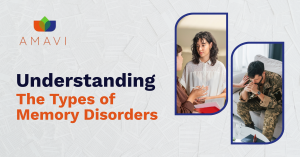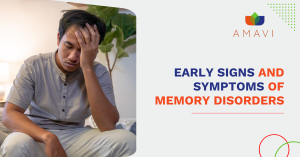When we think of memory disorders, they are often associated with aging and conditions like dementia or Alzheimer’s disease. However, memory impairments can also affect younger adults and even adolescents, presenting unique challenges that require awareness and tailored approaches. While less common, memory disorders in non-elderly individuals are a serious issue that can significantly impact quality of life, relationships, and career prospects. For families and friends, understanding practical caregiving strategies can be just as crucial in supporting younger individuals facing these challenges.Here we explore the causes and prevalence of memory issues in younger populations, the distinct challenges they face, and the importance of personalized diagnostic and treatment plans.
A Summary of Information Covered in this Blog
Memory disorders don’t just affect older adults—young adults and even adolescents can also experience serious memory impairments. Though less common, these conditions have major effects on quality of life, relationships, and careers. This article explains the causes, symptoms, and importance of personalized care for younger individuals facing memory issues.
Causes and Prevalence
- Traumatic Brain Injuries (TBI) from accidents or sports are a leading cause of memory loss in young people.
- Mental health conditions like depression, anxiety, and chronic stress can disrupt memory and concentration.
- Substance abuse and nutritional deficiencies (e.g., vitamin B1 or B12) can contribute to memory impairment.
- Neurological disorders, though rare in younger adults, may also be responsible (e.g., multiple sclerosis, Huntington’s disease).
- These disorders are often underdiagnosed due to the misconception that memory loss only affects older adults.
Unique Challenges for Younger Adults
- Daily disruptions—trouble keeping up with work, school, and responsibilities due to memory lapses.
- Emotional and social stress—younger individuals may feel isolated, misunderstood, or hesitant to seek help.
- Career and academic setbacks—difficulty concentrating or remembering information can lead to lost opportunities and added stress.
The Need for Tailored Diagnosis and Treatment
- Custom diagnostic evaluations should include medical history, cognitive testing, brain imaging, and lab work to identify underlying causes.
- Personalized treatments may involve medications, cognitive therapy, lifestyle changes, and psychological support.
- Ongoing emotional support through counseling or peer groups helps reduce feelings of isolation and builds resilience.
The Takeaway
Memory disorders in younger people are real, impactful, and often overlooked. If symptoms like brain fog, forgetfulness, or disorientation persist, don’t assume it’s just stress—seek professional help. With early diagnosis and individualized treatment, younger adults can manage memory challenges and live full, productive lives.
1. Causes and Prevalence of Memory Issues in Younger Adults
Although memory disorders are rare among younger populations, they do occur and are often rooted in specific causes. Unlike age-related cognitive decline, memory problems in younger individuals typically stem from identifiable factors such as neurological injuries, psychological conditions, or lifestyle habits.
Traumatic Brain Injury (TBI)
One of the leading causes of memory impairment in younger adults is traumatic brain injury, often resulting from sports injuries, accidents, or falls. TBI can disrupt the brain’s ability to store and retrieve information, leading to post-traumatic amnesia, where individuals struggle to recall events before or after the injury.
Psychological and Emotional Factors
Stress, anxiety, and depression are significant contributors to memory problems in younger people. Chronic stress, for example, elevates cortisol levels, which can interfere with memory formation and recall. Similarly, individuals with depression may experience difficulty concentrating and retaining new information, a phenomenon often referred to as “brain fog.”
Substance Abuse and Nutritional Deficiencies
Excessive alcohol consumption and drug abuse can lead to memory impairments, as seen in conditions like Korsakoff syndrome, caused by a deficiency in vitamin B1 due to prolonged alcohol use. Additionally, poor dietary habits can result in deficiencies of essential nutrients, such as vitamin B12, which is critical for maintaining healthy brain function.
Neurological Conditions
Certain neurological conditions, though rare in younger adults, can cause memory issues. Autoimmune disorders, such as multiple sclerosis, and genetic conditions, such as Huntington’s disease, may contribute to cognitive decline in this population.
Prevalence
While precise statistics are limited, studies suggest that memory disorders in younger adults are underdiagnosed due to the misconception that such issues primarily affect older individuals. Increasing awareness and early intervention are critical for addressing this overlooked population.
2. Unique Challenges and Symptoms in Non-Elderly Patients
Memory disorders in younger individuals come with distinct challenges that differ from those faced by older adults. These challenges often involve the intersection of cognitive decline with the demands of active professional, social, and academic lives.
Impact on Daily Functioning
Younger individuals with memory impairments may struggle to balance their responsibilities, such as maintaining productivity at work, managing finances, or keeping up with academic demands. Forgetting deadlines, missing appointments, or losing track of tasks can lead to frustration and decreased self-esteem.
Emotional and Social Challenges
Memory problems can create significant emotional strain, as younger adults may feel isolated or misunderstood by peers. Unlike older adults, who may have more societal support for memory-related conditions, younger individuals often lack the same level of empathy and resources. This can lead to feelings of embarrassment, shame, or reluctance to seek help.
Cognitive Symptoms
In younger adults, memory disorders may present with unique cognitive symptoms, including:
- Difficulty concentrating or staying focused on tasks.
- Struggling to retain new information, such as instructions or study material.
- Forgetting names, faces, or locations.
These symptoms can also manifest in more subtle ways, such as repeatedly losing personal items or experiencing frequent lapses in attention.
Career and Educational Impacts
Younger individuals with memory disorders often face challenges in their professional or academic settings. Memory lapses may affect performance, leading to misunderstandings with colleagues or educators. In some cases, these challenges result in job loss or the need to take extended breaks from work or school, further compounding emotional and financial stress.
3. Importance of Tailored Diagnostic and Treatment Plans
Diagnosing and treating memory disorders in younger populations requires a tailored approach that considers their unique needs and circumstances. Early detection is essential to prevent further cognitive decline and mitigate the impact on daily life.
Tailored Diagnostic Processes
Because memory disorders in younger adults are uncommon, diagnosing them can be challenging. A thorough diagnostic process often includes:
- Comprehensive Medical History: Collecting detailed information about potential risk factors, such as head injuries, substance use, or family history of neurological conditions.
- Cognitive Testing: Administering standardized tests like the Montreal Cognitive Assessment (MoCA) to evaluate memory, attention, and executive functioning.
- Imaging Techniques: Advanced neuroimaging tools, such as MRI or PET scans, are often used to detect abnormalities in brain structure or function. For example, these scans can identify areas of brain atrophy or signs of trauma.
- Laboratory Tests: Blood tests can reveal underlying conditions, such as vitamin deficiencies, thyroid disorders, or autoimmune diseases, that may contribute to memory problems.
Personalized Treatment Plans
Treatment for memory disorders in younger adults often requires a multi-faceted approach tailored to the individual’s underlying condition and lifestyle.
- Medical Interventions: In cases of vitamin deficiencies or hormonal imbalances, supplementation and medication can restore cognitive function. Neurological conditions may require disease-specific treatments, such as immunomodulators for autoimmune disorders.
- Cognitive Rehabilitation: Memory training programs and cognitive therapy can help younger adults develop strategies to compensate for memory deficits. Techniques like using mnemonic devices or digital tools can improve information retention and organization.
- Lifestyle Modifications: Encouraging healthy habits, such as regular exercise, a nutrient-rich diet, and adequate sleep, can support brain health. Mindfulness practices and stress management techniques are particularly beneficial for individuals whose memory impairments are linked to psychological factors.
Ongoing Support
Support groups and counseling can help younger individuals navigate the emotional challenges of living with a memory disorder. These resources provide a space for sharing experiences, building coping strategies, and fostering a sense of community.
A Call to Action for Awareness and Support
Memory disorders in younger populations are a rare but real concern that demands greater awareness and tailored care. By understanding the causes, recognizing the unique challenges, and implementing personalized diagnostic and treatment plans, healthcare providers and caregivers can help younger individuals manage their conditions effectively.
If you or someone you know is experiencing memory issues, don’t dismiss the symptoms as stress or a temporary phase. Seek professional evaluation to determine the cause and explore treatment options. With early intervention and the right support, younger individuals with memory disorders can overcome their challenges and lead fulfilling lives.






